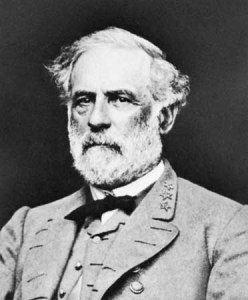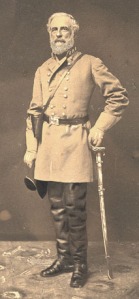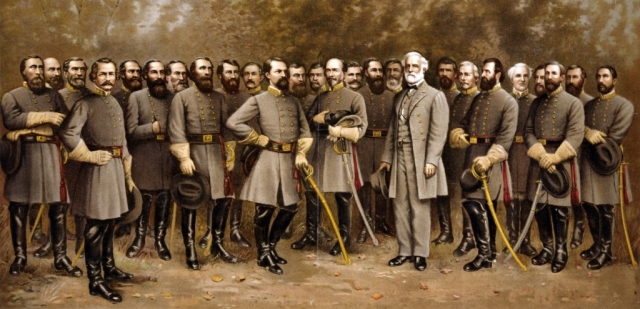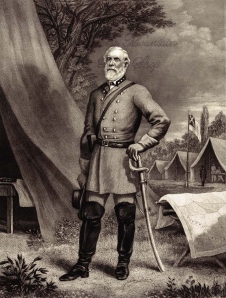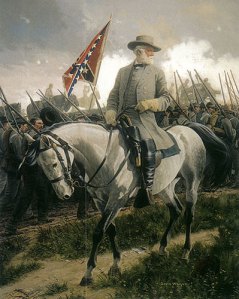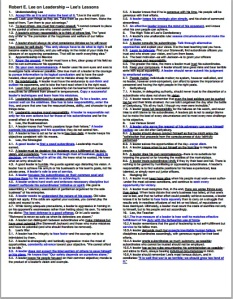Here are my personal notes on Robert E. Lee on Leadership: Executive Lessons in Character, Courage, and Vision, by H. W. Crocker III.
Robert E. Lee on Leadership — Lee’s Lessons
1. Understanding Lee
1.1. Accept life as it is and make the best of it. “Live in the world you inhabit. Look upon things as they are. Take them as you find them. Make the best of them. Turn them to your advantage.”
1.2. To lead others, one must first master oneself. “I cannot consent to place in the control of others one who cannot control himself.”
1.3. A leader’s primary responsibility is to think of others first. The “great duty of life” is “the promotion of the happiness and welfare of our fellow men.”
1.4. A leader should always do what conscience dictates so he will never have cause for self-doubt. “You only always have to do what is right. It will become easier by practice, and you will enjoy in the midst of your trials the pleasure of an approving conscience. That will be worth everything else.”
2. Apprenticeship in Mexico
2.1. Know the ground. A leader must have a firm, clear grasp of his field so that he can outmaneuver his opponents.
2.2. Do your own reconnaissance. A leader uses his own eyes and ears to investigate facts wherever possible. One true mark of a leader is the courage to pursue information to its logical conclusion and to have the cool-headed, clear-eyed good judgment not to mistake sheep for soldiers.
2.3. Be indefatigable. A leader must have the endurance to out-think and outlast his opponents, and to take the hard road when it is the right road.
2.4. Learn from your superiors. Leadership can be learned from successful executives far different from oneself in temperament. Copy a successful leader’s techniques and learn from his mistakes.
2.5. Leadership is legitimized by success under fire. To be a leader, one cannot wait on the sidelines. One has to take responsibility, enter the fray, and prove that one has the resourcefulness, ability, and character to get things done.
2.6. Leadership requires moral responsibility. A leader is responsible not only for his own actions but for those of his subordinates and for the overall effect of his enterprise.
3. Lee, the Businessman
3.1. A leader knows that “men’s passions forge their fetters.” A leader controls his passions and his appetites; they do not control him.
3.2. A leader is free to act so far as he is free from debt. A leader keeps his objectives consistent with his means.
4. Lee, the Strategist
4.1. A good leader is first a good subordinate. Leadership must be earned.
4.2. A leader must be decisive–his decisions are a fulfillment of his duty, vision, and experience. “Lee was a thorough man of business, quick to decision, yet methodical in all he did. He knew what he wanted. He knew what an army should be.”
4.3. A good leader is humble. He guards against ego distorting his vision. A leader has to achieve his army’s or his business’s or his team’s goals, not his private ones. A leader’s role is one of service.
4.4. A leader focuses his subordinates on their common goal and inspires them by his own devotion to achieving it.
4.5. A leader orders hard work and enforces necessary discipline but doesn’t suffocate his subordinates’ initiative or spirit. His goal is assembling a “voluntary association of gentleman organized for the sole business” of his enterprise.
4.6. A leader needs to understand the nature of his cause. Old rules might not apply. If the odds are against your success, you cannot play the odds and expect to win.
4.7. While taking adequate precautions, a leader is aggressive in homing in on his opponent’s weaknesses rather than fretting about his own. To reiterate the cliche: The best defense is a good offense. Or in Lee’s words: “Richmond is never so safe as when its defenders are absent.”
4.8. A leader can distinguish between subordinates who make mistakes but have great potential (like Stonewall Jackson) and those who make mistakes and have no potential (and who should therefore be removed).
5. Lee’s War
5.1. A leader has the integrity to face facts–and the courage not to be intimidated by them.
5.2. A leader is strategically and tactically aggressive: make the most of opportunities, constantly advance toward your objective. “We cannot afford to be idle.”
5.3. A leader does not expect the intervention of others to save himself or his plans. He knows that “Our safety depends on ourselves alone.”
5.4. A leader keeps his people focused on their common objective; morale is the product of a leader’s vision and example.
5.5. A leader knows that if he is generous with his time, his people will be generous with their efforts.
5.6. A leader keeps his strategic plan simple, and his chain of command streamlined.
5.7. An effective leader knows the mind of his opponent, and knows what his own people can achieve.
6. The High Tide of Lee’s Confederacy
6.1. A leader’s one unalterable rule: assess circumstances and make the best of them.
6.2. A leader consults his subordinates. Talk through alternative approaches and explain your views. It is the best teaching tool you have.
6.3. Learn to delegate. Find your Stonewall, find subordinate officers you trust and who share your vision, and turn them loose.
6.4. The best motivator–as with Jackson–is to grant your officers independence and responsibility.
6.5. The greater the risks, the more a leader must trust his subordinates.
6.6. Keep your composure. A leader should take great risks and bear terrible strife with equal equanimity. A leader should never submit his judgment to emotional swings.
6.7. People matter, individuals matter; no system, however well-oiled, and no leader, however omni-competent, can afford to ignore the importance of personnel and having the right people in the right posts.
7. Gettysburg
7.1. A leader, in delegating authority, should never trust to the discretion of a subordinate who does not share his vision.
7.2. A leader needs to remember that even the best soldiers can be pushed too far and their limits strained. As Lee told Longstreet the day after the battle of Gettysburg, “It’s all my fault. I though my men were invincible.”
7.3. A leader takes full responsibility for the failures on his watch, and never tries to shift blame to his subordinates. A leaders job is not to assign blame but to make the best of every circumstance and to meet every new challenge to his objective.
8. Lee Versus Grant
8.1. A leader who earns the respect of his adversary can save himself battles–as Lee did after Gettysburg.
8.2. A leader should always conduct himself so that he might enjoy the “satisfaction that proceeds from the consciousness of duty faithfully performed.”
8.3. A leader seizes the opportunities of the day–carpe diem.
8.4. A leader knows when to put himself on the front line to inspire his people.
8.5. A leader does his own reconnaissance–there is no substitute for knowing the ground or for knowing the realities of the marketplace.
8.6. A leader treats subordinates kindly if they try their best and fail. There is nothing to be gained by humiliating or oppressing subordinates. A leader’s responsibility is to find suitable positions for his less experienced, less talented, or simply worn out junior officers.
9. Hanging On
9.1. A leader must keep hope alive when his people must work–even suffer–under the most adverse conditions, and continue to seek every opportunity for victory.
9.2. A leader must recognize that, in the end, there are worse things even than defeat. When facts dictate that one’s business has failed, of that one’s war is lost, and that no further effort could possibly achieve success, a leader knows it is far better to face facts squarely than to carry on a struggle that results only in needless effusions of red ink or red blood, of reputations or lives destroyed. Ultimately, a leader must count the costs of sacrifice not only to himself, but to his people and act accordingly.
10. Lee, the Teacher
10.1. The true measure of a leader is how well he matches effective fulfillment of his duty with the forbearing use of force.
10.2. A leader remembers that the goal of leadership is not self-fulfillment but service to his fellow men.
10.3. A leader demands much but expects inevitable human failure, and disciplines subordinates accordingly, with generous regard for their best efforts.
10.4. A leader grants subordinates as much autonomy as possible; subordinates who cannot be trusted should not be employed.
10.5. A leader has as few rules encumbering his administration as possible–and sticks to them, always bearing individual circumstances in mind.
10.6. A leader should remember Lee’s most famous dictum, and in corollaries: “It is well that war is so terrible; we should grow too fond of it.”
________________
More Info:
Want a print-friendly copy? This pdf version of —->>Notes from Robert E. Lee On Leadership<<—– prints nicely to an 8 1/2 x 11 inch sheet. Print front and back, cut it down the center, and you have a foldable, pocket-friendly copy for yourself and for an associate. Print several.
Start your own lunch-time book study. There are more good books out there than we will ever be able to read. The interaction will add insight and practical application to your work day. Be sensitive to your work population, to attract participants. Pace the positive intent of your workplace.

